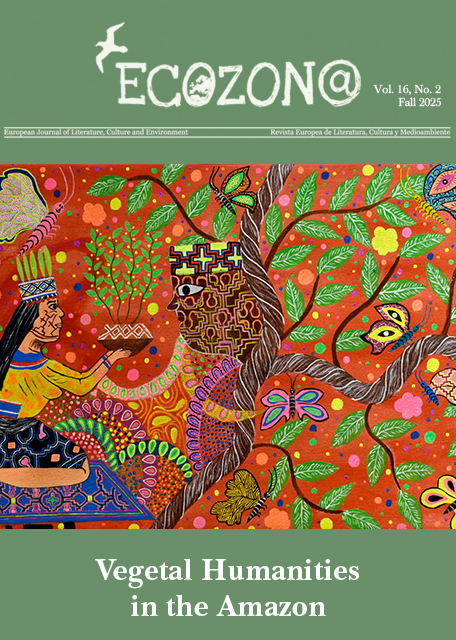<b>ContaminAzioni e AddomesticaMenti: <i>wilderness</i> e follia ne <i>L’isola di Sukwann</i> di David Vann</b> // Wilderness and madness in <i>L'isola di Sukwann</i> // Barbarie y locura en <i>L'isola di Sukwann</i>
DOI:
https://doi.org/10.37536/ECOZONA.2013.4.1.501Parole chiave:
Wilderness, ContaminAction, Nature and Madness, Materiality, ContaminAcción, Naturaleza y locura, MateriaAbstract
Abstract
In Addio alla natura (2010), a provocative essay that has enflamed a lively debate in Italy, semiologist Gianfranco Marrone argues that taking leave from Nature is the only effective way to save the environment, our human lives, and our future. By contrast, in David Vann’s Sukkwan Island, the two male protagonists (a depressed absent father and his immature son) choose Alaska’s wilderness as their ideal place for personal escapes, mental regenerations, and new beginnings. What I intend to demonstrate in this essay is how both arguments - a world without Nature and a Nature without human beings - are inevitably doomed to fail. What I propose, instead, is an idea of ContaminAction, i.e. a gradual awareness of complex issues, which need to be faced from a multiplicity of perspectives and solved through the active participation of both the human and non-human agents of our societies. Eventually, the analysis of Vann’s novella perfectly illustrates how literary texts can affect behavioral models and lifestyles. By touching upon the level of the human conscience and individual responsibility, in fact, this literary work not only reflects cogent ecocritical issues but also their practical fallouts on the reality lying beyond the page. Finally, the interconnections of nature and madness demonstrate how the redemptive power of both nature and fiction cannot transcend past errors, familial dysfunctions, self-obsessions, and a haunting sense of doom.
Resumen
En Addio alla Natura (2010), un ensayo provocador que enardeció un debate animado en Italia, el semiólogo Gianfranco Marrone sostiene que alejarse de la Naturaleza es la única manera efectiva de salvar el medio ambiente, nuestras vidas humanas y nuestro futuro. En contraste, en Sukkwan Island de David Vann, los dos protagonistas masculinos (un padre ausente y deprimido y su hijo inmaduro) eligen la tierra salvaje de Alaska como lugar ideal para escapes personales, regeneraciones mentales y nuevos inicios. Es mi intención demostrar que las dos sugerencias – un mundo sin Naturaleza y una Naturaleza sin seres humanos – están inevitablemente condenadas a fracasar. Lo que yo propongo en cambio es una idea de ContaminAcción, es decir, una conciencia gradual de problemas complejos que hay que encarar desde varias perspectivas y solucionar a través de la participación activa tanto de los agentes humanos como de los no-humanos de nuestras sociedades. Finalmente, el análisis de la novela de Vann demuestra perfectamente la forma en que los textos literarios pueden afectar modelos de comportamiento y estilos de vida. Haciendo referencia al nivel de la conciencia humana y responsabilidad individual, esta obra literaria no solo medita sobre problemas ecocríticos convincentes sino también sobre sus efectos secundarios en la realidad extra literaria. Para finalizar, las conexiones entre naturaleza y locura demuestran que el poder de redención de la naturaleza y la ficción no pueden trascender los errores del pasado, las disfunciones familiares, las auto-obsesiones, y un sentido inquietante de perdición
Downloads
##submission.downloads##
Pubblicato
Fascicolo
Sezione
Licenza
Authors who publish with this journal agree to the following terms:
a) Authors retain copyright and grant the journal right of first publication with the work simultaneously licensed under a Creative Commons Attribution License that allows others to share the work with an acknowledgement of the work's authorship and initial publication in this journal (CC BY-NC for articles and CC BY-NC-ND for creative work, unless author requests otherwise.
b) Authors are able to enter into separate, additional contractual arrangements for the non-exclusive distribution of the journal's published version of the work (e.g., post it to an institutional repository or publish it in a book), with an acknowledgement of its initial publication in this journal.
c) Authors are permitted and encouraged to post their work online (e.g., in institutional repositories or on their website) prior to and during the submission process, as it can lead to productive exchanges, as well as earlier and greater citation of published work (See The Effect of Open Access).










